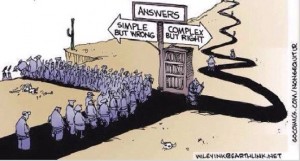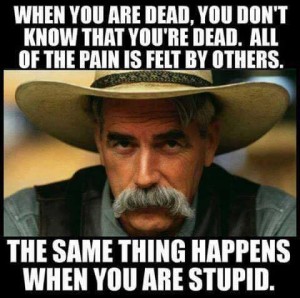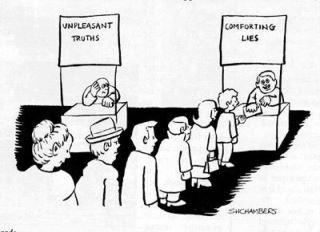 9. Free Thinking Civil Discourse
9. Free Thinking Civil Discourse
On Free Thinking & Civil Discourse
One valid democratic or egalitarian way to look at the current difficulties that human civilization is facing, is that we are all roughly equally responsible for the mess we are in. . . such as it is. And, taking responsibility for the state of our civilization begins with proper communication with one another that is based on an active and open mental attitude that we start applying first within our own selves. Although most people may already like to think they agree with the ideas on this page, simple observation shows that it is none the less true that most of us spend most of our time acting far too much like herd animals, like sheep. To that end the following thesis’s seem most relevant:
. . .
Can you or I be humble enough to know just how stupid we are?. .
(include links)
Free thought:
Let’s take a moment to consider Russel’s fun, but rather high flown, rhetoric -
 Bertrand Russel:
Bertrand Russel:
“Men fear thought as they fear nothing else on earth — more than ruin, more even than death.
Thought is subversive and revolutionary, destructive and terrible; thought is merciless to privilege, established institutions, and comfortable habits; thought is anarchic and lawless, indifferent to authority, careless of the well-tried wisdom of the ages.
Thought looks into the pit of hell and is not afraid. It sees man, a feeble speck, surrounded by unfathomable depths of silence; yet it bears itself proudly, as unmoved as if it were lord of the universe.
Thought is great and swift and free, the light of the world, and the chief glory of man.”
-Bertrand Russell “Why Men Fight: A Method of Abolishing the International Duel” (1917), pp. 178-179
Thesis #1: The error of making ultimate judgments. Ultimate or absolute judgments of the truth or value of anything (particularly about people) are almost always a bad idea.
Thesis #2: The valid need for relative judgments based on the available evidence are a necessary part of being alive (This even includes judgments regarding people).
Thesis #3: The value of open active cognitive thought. The finite and relative nature of human judgment is such that it requires our human consciousness to be continually open and actively thinking. Our consciousness may not have a lock on absolute truth or falsehood, but truth is something that our consciousness can hope to expand towards, often asymptotically. But, trying to the discern the truth cognitively need not occupy every moment of the day, because it is reasonable to spend a fair portion of our conscious time with our minds cleared of cognitive thought, and filled, for instance, with pure sensation or emotion.
Thesis #4: The profound value of a personally integrated world view. Democracy and egalitarianism (and an aversion to tyranny), among other values, requires that authority of all types should be approached with caution, and it requires that each of us must create our own integrated worldviews whose internal consistency is always open to questioning and personal growth.
Thesis #5: The value of philosophical compassion. The process of continually expanding and improving our own integrated worldview, can be tremendously fun and rewarding, but it can also be very difficult and existentially painful. Its difficulty (and its implicate corollary need for democracy to oppose tyranny) is yet another reason why we should cultivate compassion towards one another.
Thesis #6: Faith in natural reality. An individual’s faith that the finite relative world (of uncertain but approachable truths, known through sensation and empirical cognition, the natural world,) is sufficiently knowable, and worthy of knowledge, is a braver more honest, and therefor deeper and more reverent faith, then ‘faith’ in an authority or dogma.
Thesis #7: The types of authority to beware of: tradition, mandarins, charisma, those who hold power over you.

Thesis #8: The pragmatic truth value of authority and tradition. Despite the theses above it is inefficient and absurd to expect every human to create a worldview unaided by human culture. Therefore some natural trust in relevant authority, and traditionally accepted wisdom (such as canonical scientific knowledge or a traditional religious scripture), is merited. But periodic and vigilant cross checking for consistency in one’s world view, self created or otherwise, is the reverent approach to living this existence.
On civil discourse:
Thesis #9: Civil discourse equals faith in democracy. Before voting ever takes place it is certainly wise to discuss relevant ideas with one’s fellow citizens. If one is uncivil and willing to use, or worse to initiate, personal or ad hominim attacks on people, particularly regular citizens, that one disagrees with then that reflects a belief that democracy does not work. Such a belief is unwise becuase the only real alternative to democracy is tyranny which is worse than democracy of the inevitable and profoundly corrupting nature of unchecked power on the evolved psychology of the human animal.
*
*
Also-This could go under the Free thinking Great Issues, but it coud also be linked to from Socialism versus capitalism, Reverence, and the opening pages and post: Why is it profoundly pragmatic or practical to discus philosophy a lot more than most of us currently do? Because it is the different, largely unarticulated, philosophical beliefs that most of us hold that give rise the different meta ethical systems that ground the conflicting ideologies that are causing are our democratic republics to stumble. For example, the polarization that is occurring around debates about the size and role of government versus the size and role of corporations will not be solved by simply discussing details (as if there is agreement on the big picture), or by obsessing with political strategies, as if the general populace is undemocratically believed to be unredeemably stupid or evil and therefore cannot be reached via outreach, education, and discussion. That last part is key: if you are concerned that our civilization is failing, but you believe that a large part of the populace is somehow inherently unredeemable than your attitude towards them will make you part of the problem. Conversely, becoming ardently involved with philosophy is the solution.
*
Blogger’s credo: I may say some things you deeply disagree with, and that may bring up hostile emotions, but please remember I will always own that I might be wrong, I never make absolute judgements about anyone or anything (I don’t think that’s something humans should do). And, finally I have a deeply held opinion that virtually all of humility’s problems can be overcome, not perhaps physically, but mentally, emotionally, and ‘spiritually,’ via education and carefull communication (it is in the nature of language that when it comes to dealing with large abstract issues mis-communication is very easy).
I’m not sure if this is the page to say this: Not only is loving and revering this reality perhaps the most important way to show one’s reverence for god it is also the key to having reasonable and loving discusions with one’s fellow humans. This becomes particularly obvious and important when conflicts or potential conflicts arrise, and that includes the whole spectrum of human interaction from spirutual, religious, or political differences to differences with friends and family members.
Mention the wonderful Enlightenment belief that humankind can move forward via the power of the mind. But also talk about LOVE
Related posts and Links:
http://www.internationalistbooks.org/2011/12/18/8-reasons-young-americans-dont-fight-back-how-the-us-crushed-youth-resistance/ cool article from: http://brucelevine.net/





That is really attention-grabbing, You are an excessively skilled blogger. I’ve joined your rss feed and sit up for seeking more of your wonderful post. Additionally, I’ve shared your web site in my social networks